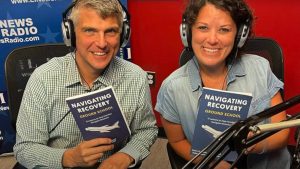
Common misconceptions about AA and 12-step meetings
Three are some misconceptions about Alcoholics Anonymous but at Adam Banks Recovery, we see many clients who are reconsidering their relationship with alcohol or other drugs and advise them to go for AA meetings. Our clients are wondering where to go for more information and what to do. We often recommend that they check out AA. It is a free program with thousands of meetings, and there is always one close to one’s work or home.
In NYC there are over 2,000 meetings per week in the 5 Boroughs. Nationally there are 114,000 meetings in 170 countries, and over 2 million members across the globe. It is the largest and most successful port-of-call for recovery. There is unfortunately a stigma associated with going to AA meetings. Nearly every newcomer questions if the program is right for them. Is it the right time? Do they have to go? And, one of the most common questions is if they have to attend meetings ‘forever.’
AA has a guiding principle, that of anonymity. This principle allows anyone to pop into a meeting, check it out and remain anonymous. No one needs to know that you went, and no one needs to know about your journey.
It’s normal to be skeptical about AA
I fully understand why people are skeptical about AA. A lot can go on at a meeting. There are traditions and norms read in every meeting and, on one’s first impression, it is common to feel conflicted, to not fully understand what is happening. It is easy to feel “different than.” Different than anyone else in the meeting, a different level of addiction, at a different place in life.
A newcomer might wonder if they will ever become one of the people dedicated to coming to meetings for years? Do they need to become one of those people in order to succeed?
When checking out AA it is important to keep an open mind. I encourage people to consider it a self-help program, just like any other program someone might choose. Someone might read a book from Oprah’s book club, attend yoga classes or go on retreat. All of these are personal choices of self discovery. Consider AA this way, with an open mind, and understand that it will take more than one or two meetings to get the hang of the program of recovery.
Let’s face it, anyone who joins AA is reluctant in the first place. No one wanted drinking to become a problem and I am yet to meet someone who wanted to join AA, either. After time, many AA members can say with conviction that it is the best choice they ever made.
After attending a meeting, many people share the same concerns, I will try to address the most common roadblocks to AA here.
Common AA Misconceptions
If you’ve been to a meeting, or simply heard about them, you may have some understandable concerns. These stem from very common misconceptions. The most common misconceptions I hear from people exploring AA are:
“AA is a religious program.”
Many people, both religious and secular, are worried that AA is a religious program. They either fear that the program will contradict their own religious beliefs, or that it will try to force them to become religious.
While it is true that the 12 Steps of AA reference God, it is important to know that there is no definition of God or god from AA. The 12 Steps ask members to let a “power greater than themselves” help restore them to sanity. Members of AA are free to define this power as they wish. It could refer to the program itself, the person’s support system, the universe, or relate to any spirituality based on their own experience. Full recovery from addiction involves physical, mental, social and spiritual recovery. Someone’s “bottom” in addiction is more often than not an existential or spiritual bottom rather than a physical one.
“I have nothing in common with those people.”
I find this an interesting take-away from attending a meeting, when the exact opposite is true. Every single person in an AA meeting has been on a journey, struggling with substance use. The only difference between previous members and a newcomer is days, weeks, or months of continuous sobriety. AA members are acutely aware of where they came from in their journey.
“They are all worse off than I am.”
There isn’t much to gain from comparing rock-bottoms. The end-of-the road for one person’s substance use is not the same for another. It is a personal decision, usually defined by a personal black hole, when someone is “sick and tired of being sick and tired.” Deciding to get sober earlier is certainly better than waiting to the bitter end.
“It feels like a cult.”
If you‘ve never ran a marathon, you will have much more success in training if you gone a marathon training group. The first day in that group would be awkward, the group wears the same shirt, has similar shoes, and has a history. But after attending a few times, you get swept up with the energy, you get excited about sticking to a schedule, and you make a few new friends.
Every meeting has a history and has norms. Many meetings have gone on for years or decades. It is likely that people at any one meeting know each other. They may have gotten sober together or attended the same meeting for years. They certainly know each other better than members of most other organizations, and they likely have committed to the same principles. But no one is ever expected to do anything that is not in line with their personal values. No one is expected to profess belief in any particular god or God or set of rules. It is also not a closed clique. In all meetings, newcomers are warmly welcomed and there are many members that would freely give to help the newcomer out.
The social aspect of recovery is very important; building a sober squad, making new friends, and sharing in progress are all very important. AA is an affinity group built around shared interests, and lets face it, looking from the outside into any affinity group can look a little weird. There are groups built around collecting candles, stamps and showing dogs and cats. We are social beings, we need that interaction to move forward. We get father in groups than we do along.
“There are too many rules.”
Can you believe that there are no rules in AA? It’s true, there are absolutely no rules for anyone to follow. However there are suggestions. AA has a long history of helping people recover. This information is handed down from one set of members to the next. AA members are happy to help others out. They will tell others what worked for them and what didn’t work for them. There is no set way to get sober or to be a member of AA. Everyone “works” their own program of recovery.
Usually the suggestions are pretty common sense, and dispatched in the form of slogans. “Don’t drink and go to meetings…nothing changes if nothing changes” and “progress, not perfection” are some of my favorites. A newcomer is free to accept suggestions, or to work a program of their choosing.
“They want money.”
It is explicit in AA that there are “no dues or fees for AA membership.” However, there may be expenses involved in running a meeting. A meeting might have to pay rent (usually cheap rent in a church basement, but rent nonetheless), the meeting might provide coffee, as well as free literature. All AA meetings must be self-supporting and cover any expenses that it may incur. It is normal for members to kick in $1 to $3 per meeting that they attend to help the meeting cover any of these costs. Newcomers are explicitly told not to donate money until they have attended enough meetings that they see value in doing so.
At AA, you’ll learn more about how drinking relates to you. There is no commitment you need to make to AA, no barrier to entry, and no barrier to leaving. By attending multiple meetings, people questioning their substance use will learn and will connect with others who have been in the same place. Questioning their relationship with substances. The real healing in AA comes from the friends and personal relationships that can be made there.
An AA meeting is the perfect place to learn about how to live a sober life. There are thousands of meetings all over the country. Odds are that you live very close to one. It could even be happening down the street from you tonight. Try it out, and if you’ve tried it once, try it again. Little is expected from you when attending an AA meeting, other than a desire to stop drinking and a willingness to try.
About Adam Banks
Adam Banks is a certified interventionist and the owner of Adam Banks Recovery. After receiving an MBA from the University of Chicago, Adam built a company that was later acquired by United Health Care. His discipline and attention to detail comes from his former career as an airline pilot, holding an ATP, the FAA’s highest license.
Today, Adam is dedicated to helping others achieve long-term sobriety. His work has guided executives, pilots, and physicians on paths to recovery. Adam brings families together through a loving and inclusive approach.
Adam has authored four books on addiction. His recent work, Navigating Recovery Ground School: 12 Lessons to Help Families Navigate Recovery, educates families on the entire intervention process. He also offers a free video course for families considering an intervention for a loved one.
Adam is available for alcohol and drug intervention services in New York, Long Island, the Hamptons as well as nationally and internationally.




